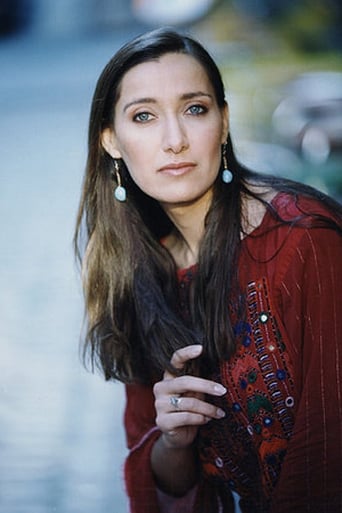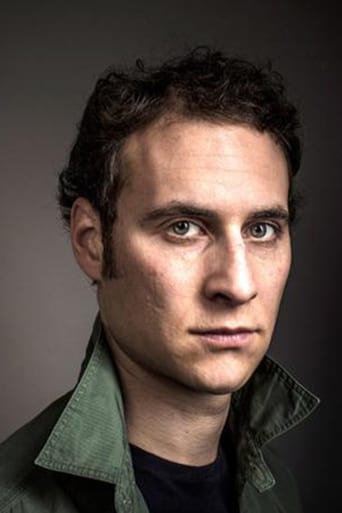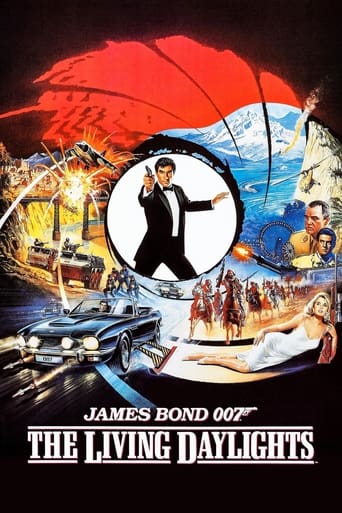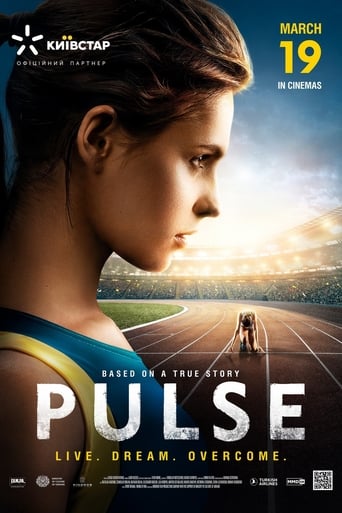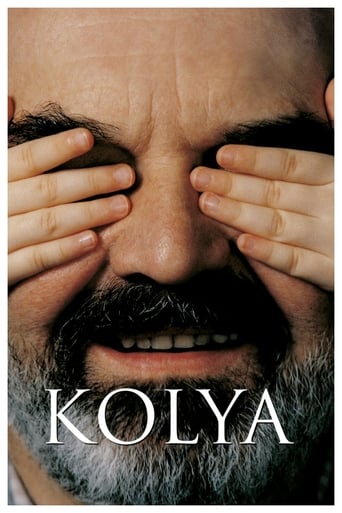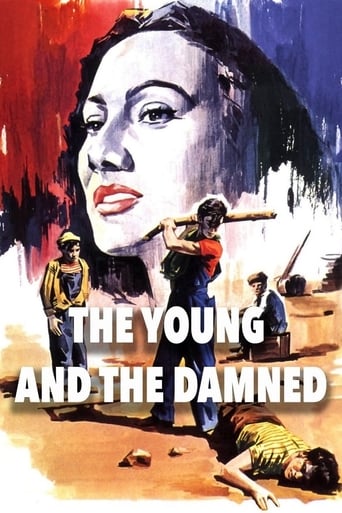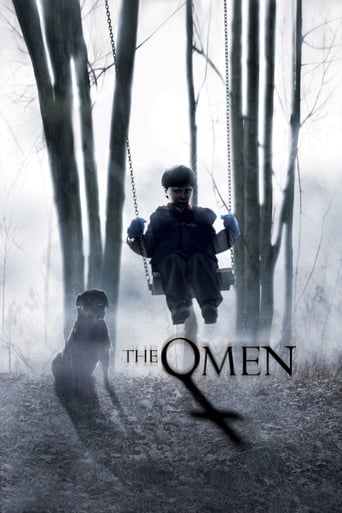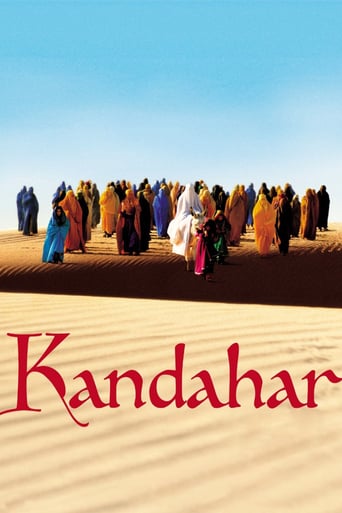
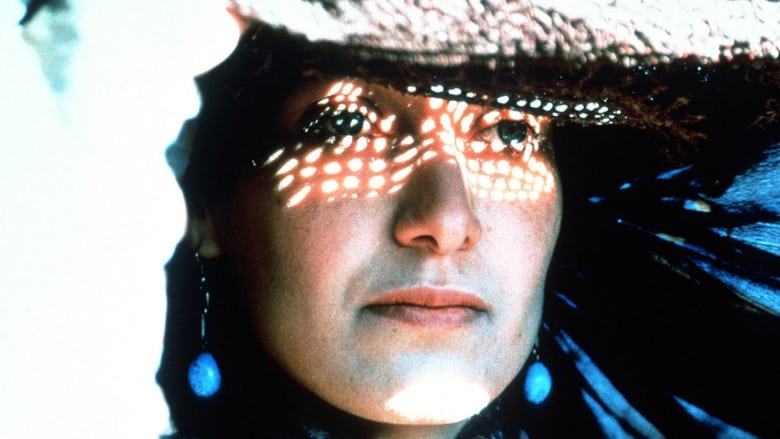
Kandahar (2001)
After an Afghanistan-born woman who lives in Canada receives a letter from her suicidal sister, she takes a perilous journey through Afghanistan to try to find her.
Watch Trailer
Cast


Similar titles
Reviews
This is about the return to the place of childhood; a woman must return to Kandahar before the next eclipse when her sister plans to commit suicide. She is an ex-pat journalist so that we can have an intellectual view about the contrasts of life whispered into a tape recorder but all that is flat and uninteresting and the poetic soliloquies even more. Brush that aside. No, why this should be illuminating is because it swoops down in a strange corner of the world and finds intimacy and truth among the absurdity. Not for any contrasts the filmmaker can whisper to us but for those the place can whisper to his camera. This is what Chris Marker did again and again, who is the inspiration behind this; the eye reflected back. This too what Herzog did, who chases after absurdities because the landscape close to them tilts revelations.Absurdities abound along the way here; a makeshift hospital where amputees clamor to be fitted with crude artificial legs, the legs dropped from the sky. The rosy afterglow of flat desert is an evocative canvas, the veiled women chill like they always do with that sense of wasted beauty. But so little here feels stumbled on to, discovered, open; it feels stagy and contrived. A quick look at the background of the film reveals that it was shot, a little more safely perhaps, on this side of the Iranian border. The faces, the dresses, the landscape, all these are probably not much different than over there, but there's also no urgency anymore. I won't pretend to know better than the filmmaker of course but the whole film strikes me as more about culture than reflection, the kind of culture about faraway, oppressed places patrons love to consume at film festivals in Europe.Maybe it's his way of saying there are no more vital truths than the absurdity that people contrive to create that has a male doctor examining an Afghan female patient through a hole so as to not see her face. But there must be, there are.
Mohsen Makhmalbaf's "Safar-e Ghandehar" ("Kandahar" in English) is one of those movies that turned out to be more significant than the people involved in the production assumed that it would be. Even when it got screened at the 2001 Cannes Film Festival, most people worldwide had never heard of the Afghan city. But the 9/11 attacks focused everyone's attention on the Central Asian country, and suddenly, cities like Kabul, Kandahar and Mazar-e-Sharif started appearing on the nightly news.This Iranian-French co-production makes the Taliban's Afghanistan look like the most miserable place, especially for women. The saddest thing is that the Taliban would've never taken over had the USSR not invaded Afghanistan, prompting the US to back Islamist fighters against the Soviet army. Even with the Taliban out of power, the situation for women in Afghanistan looks as bleak as can be (to say nothing of Afghanistan's narco-economy).The most interesting thing about this movie is that it shows us people's daily lives in an isolated society. Told from the point of view of an Afghan-Canadian woman looking for her sister, it's a devastating look at the country. I recommend it.
I was moved by the beauty brought to a situation of suffering and tragedy. As our protagonist struggles to find her sister, the horrors of postwar Afghanistan are revealed through simple encounters with a variety of people with struggles of their own. The pacing, which may seem tedious to folks used to fast action, allows a lyrical visual beauty to arise where another filmmaker may have shown chaos. In turn, this lyrical beauty creates a stillness where compassion begins and grows. What was distant & abstract becomes close & personal. We're shown a perspective on war that is at once starkly simple and deeply caring. I also enjoyed the taste of Persian culture. The legacy of Hafiz, Rumi & other great Persian poets flavors the vivid poetics of Makhmalbaf's cinematography, dialog, and plot structure. Quite a taut alternative to our American viewpoint.
All cultural values are in some senses relative. We make criticise, say, the Taliban regime in Afghanistan for forcing women to wear the burka; but our own society enforces different standards with regard to the male and female exposure of the chest. We might therefore say that the burka is oppressive not so much in itself but rather as part of a system that undermines the freedom of women; but this is to assume that in our sexist, and over-sexualised, society, women are in practice freer. In fact, I believe they are; but at some level it is important to acknowledge the arbitrariness of such positions at the deepest level; that they depend on prejudice (to use that word non-prejudicially), on values rather than reason. To argue that because we know nothing for certain we should therefore do nothing, think nothing is a doctrine of futile despair; but to be aware of the limitations of our own thinking, to know that for certain future generations will surely condemn us are clearly as we condemn others, is vital before we consider the values of societies other than our own, a secular equivalent of humility before God.This is not to say I would like to see a film defending the appalling Taliban. But even the most tyrannical regime is in some regards the product of the society it tyrannises: we are all both prisoners and guards. To understand that regime (and its true horrors), one needs to understand how it worked with, as well as against, the grain of traditional society; and what is good, as well as what is bad, about that. Unfortunately, this is not what we get with 'Kandahar'.It's a shame, because this film contains the potential material for exploring the ambiguity of life. Its central character is rude, arrogant and ambitious (a journalist travelling to Afghanistan to try and save her sister, she doesn't hesitate to try to try and make a story out of her ordeal at the same time). A returning exile, she might be considered as both having the right to criticise what is happening to her country and also the eyes of one who has seen enough to know what is wrong. But one could just as easily say that she has neither that in fact she has the rights to neither position. There is thus the potential to portray her with great ambivalence; but 'Kandahar' prefers the values of propaganda. So instead she is our witness, our seer and our reliable narrator; and the film is all the weaker for it.'Kandahar' contains some great footage of a bleak but beautiful country, but at times its limited budget shows. The dialgoue is strange, the second most important character is (bizarrely) an American, and a number of the scenes sit uneasily between documentary and fiction: Michael Winterbottom did something similar in 'In This World', but that film was more convincing, because the agenda of the director was less clumsily imposed on every scene. 'Kandahar' has neither documentary truth or dramatic ambiguity; and seems to view the world with a very Western slant. Perhaps evil is like Schroedinger's cat: something that can be labelled or shown, but not both at the same time. 'Kandahar' prefers to label; but I prefer more subtlety in my films.


